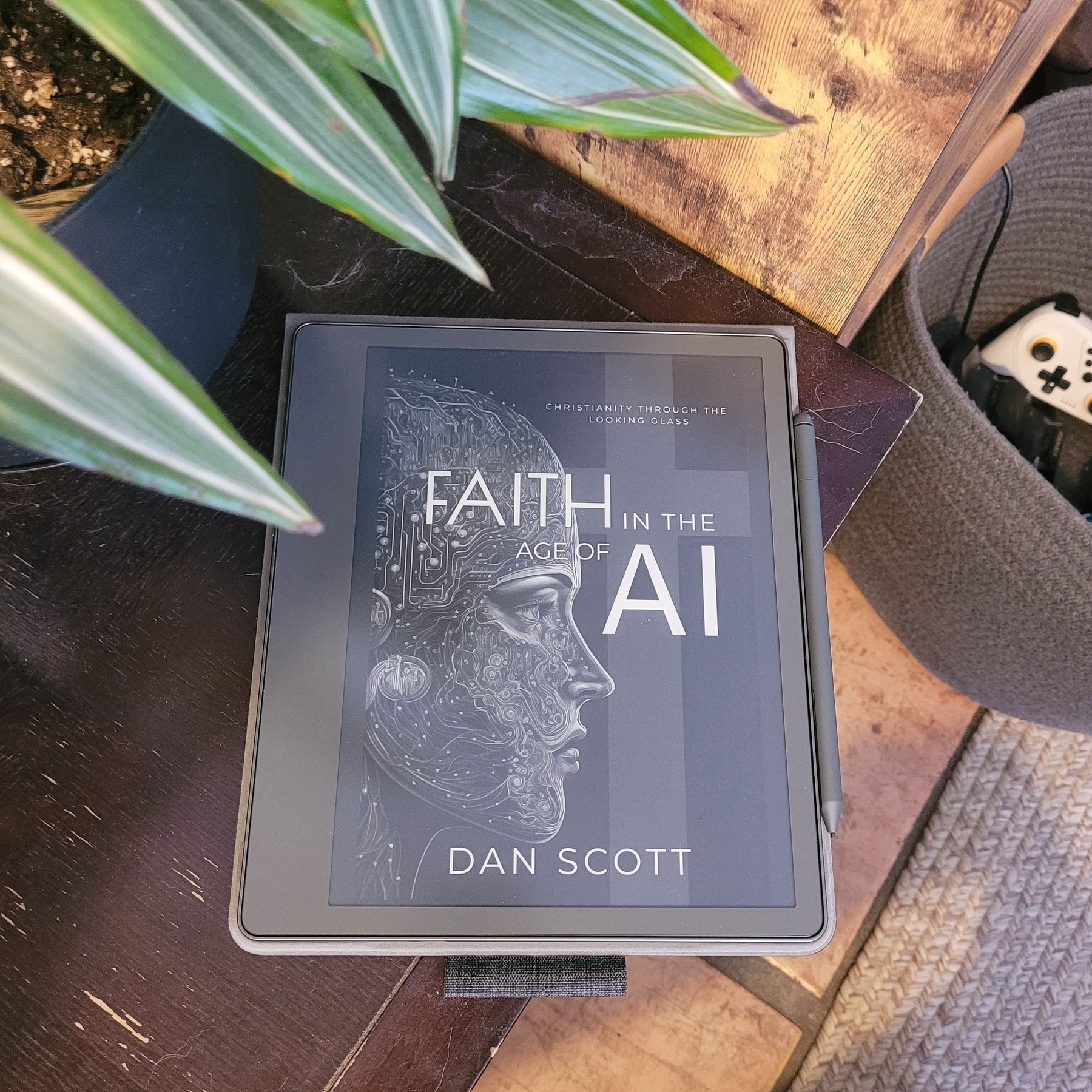Artificial Intelligence

Thinking about the ethics of disclosing how I use AI in various capacities, both in design and for the church. AI has become a regular conversation partner for me and a tool I use often to manipulate/format text, come up with ideas, and get feedback on drafts. I also use it to generate summaries of material I create (like sermons) that I edit for YouTube descriptions, etc.
FAITH IN THE AGE OF AI IS NOT ONLY POSSIBLE…IT IS ESSENTIAL
A review of Faith in Age of Artificial Intelligence: Christianity Through the Looking Glass by Dan Scott
There is no question for me, as an Elder Millennial that witnessed the advent of the Internet, the introduction of the smartphone, and the rise & fall of social media, that a new era is upon us. We are, of course, only scratching the surface of the implication of newly unveiled “artificial intelligence” technologies.
Much of the handwringing does seem, at this point, to be a bit overblown. Still, no one can doubt the real economic and creative implications of machines that—dumb as they may be in reality—can convince, or very nearly convince, most people that they are humans.
No sphere of life or industry will be left untouched by AI, and as it gets better, ethical lines will become blurry, and our grasp on what we think is real will seem a bit slippery. Circumstances will emerge that would have seemed the stuff of far-out science-fiction only a decade ago. But here we are.
A much needed book
Dan’s Scott’s book, Faith in the Age of Artificial Intelligence: Christianity Through the Looking Glass comes at the perfect time. We’re asking questions we didn’t know could be asked mere months ago.
From a Christian perspective, we are quickly finding that yesterday’s assumptions and answers will not do—but then, Scott helps us realize those answers were kind of new, anyways.
Contemporary Christianity has in many of its broadest circles lost touch with the kind of deep philosophical and theological reflect that characterized the early Christians. So, Scott wants to ground us the thinking of this ancient Christian community, a community that thought deeply, on similar (though not identical questions) of creation, consciousness, evil, incarnation, and the nature of divinity.
This, he does masterfully, synthesizing for the regular guy like me an immense amount of essential (and difficult) reading into 23 accessible chapters.
Faith in the Age of AI isn’t really a book about the specifics of artificial intelligence, per se. Instead, it’s a sort of guidebook to navigating the kind of world in which AI exists. Scott uses this emerging technology and the questions it raises to as a launch pad to explore the most important ideas we need to know, demonstrating along the way the viability of a Christianity grounded in ancient thought as a path into the future.
Ancient-future Christianity for the digital age
In the opening pages, Scott reminds us that “Christianity is…more than a community of people sharing spiritual experiences or affirming certain ethical and moral principles. Christianity is (or is intended to be) a philosophical school that trains us how to relate to and respond to reality.”
We are then presented with crash-courses in consciousness, theology proper, meaning, information-theory, the historical claims of Christianity, the nature of humanity and meaning, and more, all in conversation with Christian voices of the first five centuries.
The level of accessibility of all of this is impressive, but it never feels dumbed down. That said, plan on spending some time with this book. The ideas, while presented in a very understandable way, are big enough to cause one to pause for minutes, hours, or even days between chapters, pages, and paragraphs.
Deconstruction isn’t the end
I think this book could be a special help to those of us that have gone through the much lambasted and lamented “deconstruction” process. We find much here to help us “reconstruct” something different. This something will be different, no doubt, than what was always destined to be crushed by reality.
Dan Scott is providing a blueprint and materials to build back a faith that is strong, flexible, beautiful, and true.
This book isn’t just relevant. It’s needed.
Scott rightly observes, “Serious people often have serious questions.” Thankfully, he’s offering honest answers that leave room—and even encourages—further exploration rather than closing the door on humble inquiry.
If you care about how to move, grow, and flourish in the increasingly unfamiliar territory represented by the recent emergence of AI, and especially if you are curious as to how Christianity might speak into this, then this book is for you!
→ Get it on Amazon
Bishop Scott is synthesizing and analyzing a tremendous amount of key ideas for the Christian community here. Really outstanding work.

Well, it’s happened. An entire church service generated by AI.
 NRH
NRH